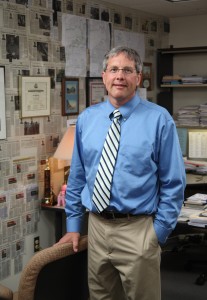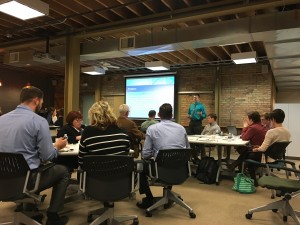A unique and collaborative partnership between Spectrum Health Innovations (SHI) in Grand Rapids and Hope College’s Center for Faithful Leadership (CFL) is providing opportunities for both parties to glean the benefits that any good partnership seeks to achieve: combining ideas and labor toward reaching desired outcomes. For professionals at SHI, the objective is to create technically-feasible and market-desirable health care products that meet the needs of patients and clinicians alike. For students at Hope, the goals are leadership development and experiential learning. It’s proving to be a win-win association.
“A liberal arts education is a journey that exposes students to different ways of thinking, to different possibilities in education and life.”
CFL students and mentors and SHI ideators and project managers have been working together since 2014 to create better health-care services in interdisciplinary ways. It is this convergence of teaching, learning, innovation, and scholarship that makes CFL and SHI perfect partners. SHI provides the ideas and technical input; CFL students provide the labor and processes to idea validation. To date, more than 70 students with majors in accounting, communication, management, philosophy, engineering, religion and computer science have tackled 10 challenges. The most recent include a schedule software project, a neonatal ETT (Endo-Tracheal Tube) holder project, and a device to load a wheelchair into the trunk of car. Each melds multiple perspectives and breaks down disciplinary boundaries—a demolishing of silos, if you will, that results in these partners doing work on one big idea farm.

“A liberal arts education is a journey that exposes students to different ways of thinking, to different possibilities in education and life,” says Dr. Steven VanderVeen, director of CFL and professor of management. “Our partnership with SHI is about just that. It gives students from several different majors experiences to discern and develop their gifts and calling on their timelines. They get to learn this in college, not after they graduate. This is what drives CFL.”
The scheduling software project is headed up by Ben Schipper, a communication major and 2015 December Hope grad. Schipper and 12 others—professionals from SHI, CFL mentor Jim Cnossen, along with economics and computer science students—are working to eliminate the time demands associated with manually scheduling patients for numerous specialist appointments for in-patient rehabilitation. Department managers are currently spending hours using an old-school spreadsheet methodology to schedule patients’ therapies, but the new software will automatically generate a patient’s schedule instead. The goal of its creation is to save valuable staff time, time that could be spent otherwise caring for Spectrum Health patients. Numerous months, meetings, and program iterations later, with assistance from Dr. Ryan McFall of Hope’s computer science department, Schipper and his team are close to auditioning a finished product within the next several weeks.

Meanwhile, the neonatal ETT holder team, with assistance from Dr. Roger Veldman of Hope’s engineering department, hopes to debut a prototype by the end of this semester while the wheelchair-loading device team just got started on customer discovery research.
“Hope students have great dedication to their projects,” says Lori Henry, a project manager at Spectrum Health Innovations. “They are motivated to have an impact to create real-life solutions. The highlight of the semester for me is hearing them present their findings at the report-out (a culminating presentation). I see their passion and it makes me excited about what we do.”
Hope is one of four colleges and universities in the region that partner with SHI. Each semester, VanderVeen meets with SHI leaders to determine if CFL will renew or exit the partnership. To each partners’ delight, the computer science and engineering departments have become directly involved with SHI, too.
“In the end, these collaborations are all about patients and people.”
“Regardless of the project,” says Scott Daigger, manager at SHI, “we focus on a couple goals. We want to work together with our college teams to find viable solutions to the ideas we have. That is foremost for us. We also want to help solve bigger problems that could benefit health care as a whole.”
“We’re educating students so they know what their gifts are,” says VanderVeen of CFL goals. “How do you know if you are good at something? You get involved and find out. It is the discernment of gifts and calling, alongside leadership integrity, that this partnership is all about.”
While many projects fail to move from idea to finished solution—supporting the statistic that less than 10% of all new notions actually see a validated end—the CFL-SHI partnership provides a 100% great experience rate for all parties involved.
Concludes Lori Henry, “In the end, these collaborations are all about patients and people.”

